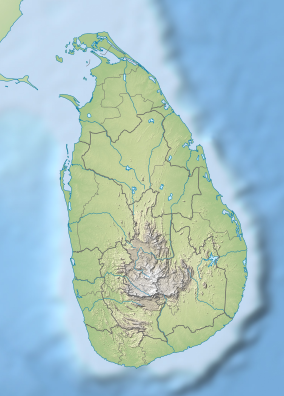This article needs additional citations for verification. (April 2017) |
| Dumbara Mountain Range | |
|---|---|
 A view of the Dumbara mountain range (Spinix 2 and five peaks behind) | |
| Location | Central Province, Sri Lanka |
| Nearest city | Matale |
| Coordinates | 7°27′N 80°48′E / 7.450°N 80.800°E |
| Area | L |
| Governing body | Department of Forest Conservation |
| World Heritage site | 1203-003: "Knuckles Conservation Forest (KCF)" since 2010 (within the site Central Highlands of Sri Lanka)[1] |
The Dumbara Mountain Range lies in central Sri Lanka, in the Districts of Matale and Kandy. The Sinhalese residents have traditionally referred to the area as Dumbara Kanduvetiya meaning Mist-laden Mountain Range. Early British surveyors gave the name knuckles, referring to a series of recumbent folds and peaks in the west of the massif which resemble the knuckles of clenched fist when viewed from certain locations in the Kandy District.
The higher montane area is often robed in thick layers of cloud. In addition to its aesthetic value, the range is of great scientific interest. It is a climatic microcosm of the rest of Sri Lanka as the conditions of all the climatic zones in the country are exhibited in the massif. At higher elevations there is a series of isolated cloud forests, harbouring a variety of flora and fauna. Although the range constitutes approximately 0.03% of the island's total area, it is home to a significantly higher proportion of the country's biodiversity. The isolated Dumbara range harbours several relict, endemic flora and fauna that are distinct from central massif. More than 34 percent of Sri Lanka's endemic trees, shrubs, and herbs are only found in these forests. Dumbara (Knuckles) Conservation Forest was included in UNESCO natural world heritage list in 2010 as part of Central Highlands of Sri Lanka.[2]
- ^ "World Heritage Committee inscribes two new sites on World Heritage List". UNESCO. July 30, 2010. Retrieved 1 August 2010.
- ^ "Central Highlands of Sri Lanka". UNESCO World Heritage Centre. Retrieved 2019-09-21.
